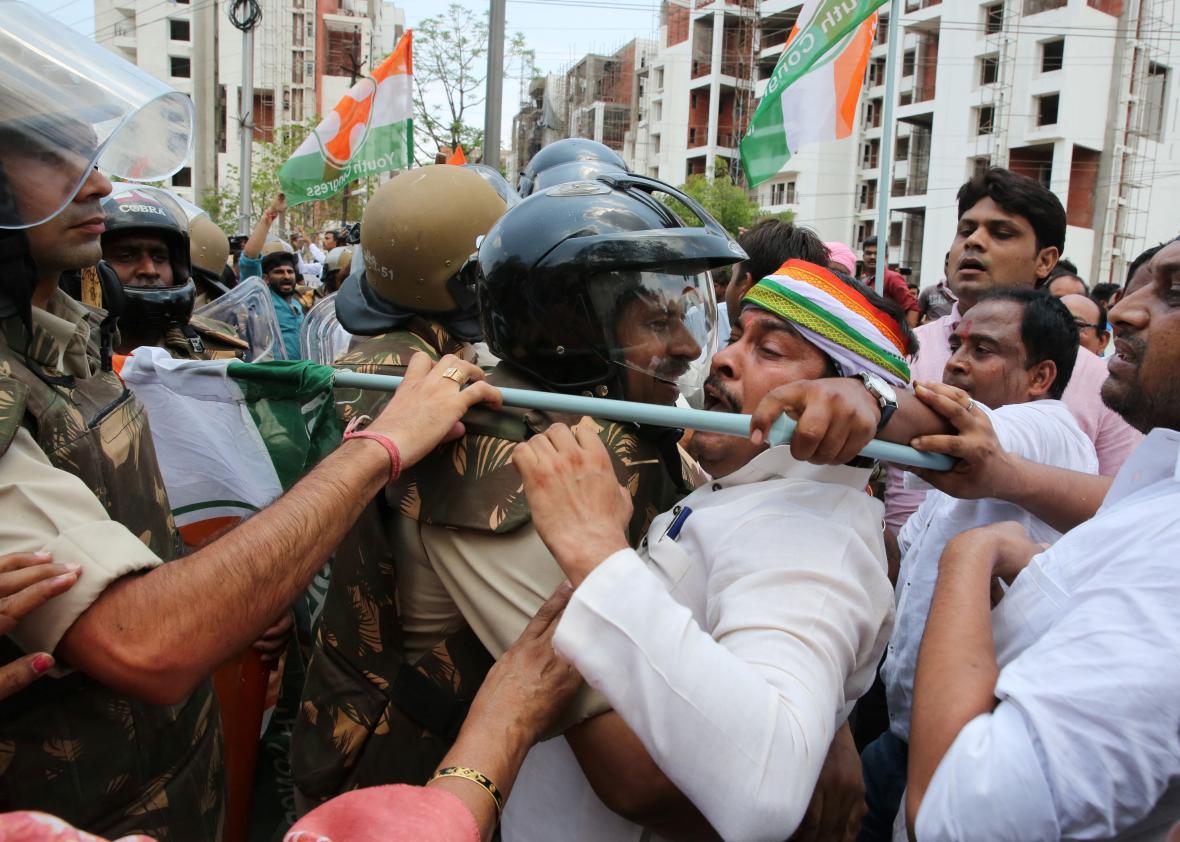The Indian state of Madhya Pradesh has been rocked by a wave of violent protests by farmers after local police admitted Thursday to the fatal shootings of five civilians. The world’s largest democracy deployed 1,000 paramilitary troops last week to counter angry farmers in the state, where agriculture jobs make up two-thirds of the workforce.
While India’s prospects for economic growth are soaring, an agrarian crisis has been spreading over the last few years. More than 8,000 farmers committed suicide in India in 2015, according to the National Crimes Record Bureau, a staggering 42 percent increase from 5,650 suicides in 2014. The bureau attributed these suicides to bankruptcy and indebtedness due to crop failure and default on loans. Some Indian media outlets reported that 1,600 farmers killed themselves in 2016 in the state of Madhya Pradesh alone.
With farmers roughly constituting more than one-third of India’s 1.3 billion population, the ruling Bharatiya Janata Party government under the populist leadership of Narendra Modi cannot ignore these alarming figures.
Against a backdrop of torched vehicles and pelting of stones, a spokesperson for the farmers union, Sunil Gaur, told Indian media that the protests in Madhya Pradesh will go on in defiance of a round-the-clock curfew. “We will continue our protest until the government accepts our demands,” Gaur said in a statement Thursday.
Protesting farmers have been demanding the government set a minimum price for their produce in addition to providing loan waivers. Although the government’s waiver program promises relief to debt-ridden farmers to help them from defaulting on their loans, Indian auditors in 2013 recorded corruption in the system. A report authored by the Indian Comptroller and Auditor General in 2013 found improper use of funds, with many illegible farmers benefiting from the waivers.
The state’s chief minister, Shivraj Singh Chouhan, tweeted an appeal for calm and an end to the protests Wednesday: “I appeal to my fellow brothers to maintain peace. I am deeply pained by the turn of events today. I stand by families in this hour of grief.”
This came after Home Minister Bhupendra Singh publicly admitted that the five farmers killed Tuesday had been shot by the police. Indian media reported that the Madhya Pradesh police opened fire on a large crowd of farmers protesting in the streets after the crowd refused to disperse despite being tear-gassed. The farmers had been pelting stones, shutting down shops, and torching vehicles prior to the shootings.
Before his admission, Singh told Indian media he blamed the deaths of the farmers on “anti-social elements.” His boss, Chouhan, meanwhile blamed the opposition party, Congress, for “misled provocation.”
A political mud-fest has since ensued, with both parties exchanging harsh words while farmers continue their protest. Spokesman for Congress Abhishek Singhvi told media outlets, “BJP has almost been acting like a curse of death for Indian farmers.”
Bharatiya Janata Party leader Kailash Vijayvargiya was quoted in Indian media accusing Congress of exploiting the crisis:
Madhya Pradesh is a very peaceful place and will continue to be so. The BJP has always done well for the farmers and have also paid heed to all their demands. We are trying our best to curb the violence and also will resort to all their demands. The whole reason behind this situation is ‘Congress’ who needs to be blamed as they are grabbing focus in this violence.
The crisis in Madhya Pradesh presents a major blow to the government of Indian Prime Minister Narendra Modi. The party, which secured a landslide victory in the 2014 elections against Congress, promised prosperity for India’s farmers. Modi himself on many occasions promised to double farm income by 2020, and in the Indian state of Uttar Pradesh he promised loan waivers for farmers during a campaign rally before the state assembly election.
With his electoral promises coming back to haunt him, maybe Modi and his government should engage with rebelling farmers instead of showering them with bullets.
